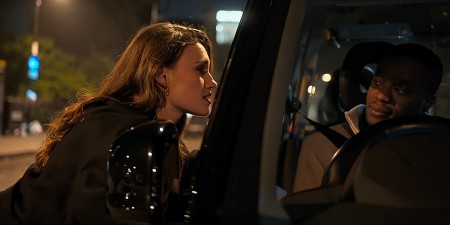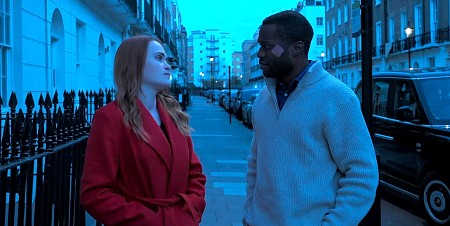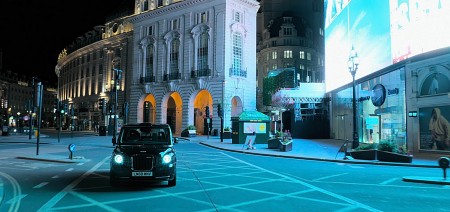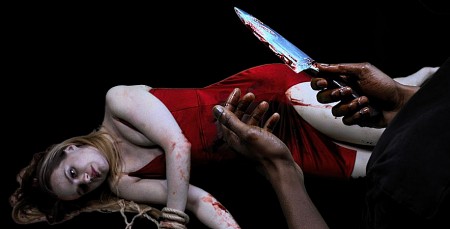|
Your new movie Midnight
Taxi - in a few words, what's it about?
Bertie: In Midnight
Taxi, cab driver Eddie wakes from a night shift nap to discover a
dead woman in front of his vehicle. At first, he calls the police and does
what everyone should, but as he realises he has begun sleepwalking again,
he starts to question his sanity. The potential guilt leads him to obsess
over the dead woman and become a detective to figure out what happened to
her that night. He has to forge new relationships, take risks and look
into his past to piece together the truth.
What were your sources of inspiration when writing Midnight
Taxi?
Samantha: London itself was the biggest inspiration. During those first few months of the
pandemic and Covid lockdowns, I walked all around the city (usually with
my dog), and it was just the most surreal experience. No traffic. No
tourists. Not even many residents, it turns out. I just remember thinking
“This is like the opening to 28 Days Later” and thinking it would be
so much fun to make a movie taking advantage of the once-in-a-lifetime
(hopefully) stillness of London. I’m a big mystery fan, so deciding to
ruminate on a noir-mystery storyline to suit was only natural.
Bertie: I love the feeling quiet late nights can evoke, after the commuters have
gone home from work and the pubs have shut, an eerie calmness takes over a
city. It’s a time when people are usually close to sleep, and films can
play with ideas during this near-unconscious time when you might be awake
or dreaming. I love films like Under The Skin, You Were Never Really
Here, Dark City, After Hours and Collateral, which all capture this vibe,
including both the menace and the surreal energy nighttime can bring.
Since you co-wrote Midnight
Taxi with one another, what was the writing process like?
Samantha: We have two very different approaches to writing. I have always been a
writer and I love the “butt in chair” element of just getting the
words on the page. We went through a lot of drafts with some pretty
serious changes - and I think if the lifting of lockdowns hadn’t been a
countdown for us (we needed the lockdown level of traffic to have a hope
of shooting anything) we probably would’ve done more.
Bertie: I’m always trying to look at the big picture angle. Why this scene here? Why
is this character doing this? How can we add more tension? Sam and I would
have long discussions about unreliable narrator elements, character
motivations and how do we sufficiently hide the clues in the film, so they
work on re-watches but you don’t see it coming on the first watch.
What can you tell us about Midnight
Taxi's approach to the thriller genre?
Bertie: I love the classic noir trope of the unreliable narrator - is this the
protagonist or the antagonist we are watching? It gives stories so much
room to play in and increases the tension in every interaction. By having
the lead character Eddie question his own mind and his own memories, we
keep him and the audience guessing throughout.
Samantha: We approached the first draft of the film with two beats in mind: the ending
and the catalyst. Since we knew where we were ending up (aka the
“whodunnit” part), it was fun to figure out how to get there. It was
also critical that we didn’t make Eddie too good as a detective because
that’s not what he is - he’s a driver. Keeping the “amateur”
spirit of “amateur detective” was important to us.
A few
words about your overall directorial approach to your story at hand?
Bertie: The
number one priority when planning out scenes was figuring out every
character, their mental state, how they see themselves in the world and
their desires. We took a lot of care to cast great actors who could embody
these precise characteristics we imagined when writing the script. When
working through those scenes, we helped steer the actors towards their
characters’ appropriate moods and concerns for those moments.
When it came to the practicalities of filming
sequences, our self-imposed restrictions helped focus us on which areas we
could plan for and control. For example, with so much of the film taking
place inside the cab, we had to figure out how to make every interaction
in the vehicle feel different and reflect that moment in the story. Where
does a character sit? Do we shoot through the exterior glass, keep them
small in the frame or move in for a close-up? Do we use a pleasing angle,
or do we shoot at an aggressive Dutch angle or side-on? How do we
emphasise the emotion or tone of each scene? This would then follow
through to the sound design and soundtrack - which scenes have music
accompanying them, and how should the music reflect the on-screen action?
|

|
Samantha: The
cab introduced a lot of challenges, of course, but we were lucky to be
able to prep and test a lot with it before shooting. When it came to the
“on the street” stuff, that was all guerilla, all stolen. We did a
bunch of location scouts, but when you’re shooting guerilla you have to
roll with whatever is going on the night that you turn up to shoot - which
could be anything.
Do
talk about your collaboration when directing Midnight
Taxi, and did the both of you have any fixed roles when on set or
was this more of a flowing process?
Samantha: It was a bit of both. During pre-production, we were more delegatory with
“I do this, you do that” based on our experience and strengths. Once
on set, it was more fluid and we settled into a natural rhythm like Bertie
as the one-man camera department and myself as a quasi-AD keeping the
schedule and locations in check, but both of us doing whatever needed to be
done at the time.
Bertie: Production was in a near-constant state of scramble. We had very little
time to change setups, to move between locations, to get a second or third
take. It was always an all-hands-on-deck approach between us and any crew
members we had available on the day. If I needed help with a lens change
or battery swap, Sam would be there opening the kit bag. If she needed
help with a malfunctioning prop or an insurance company issue, I would be
there in a millisecond.
What can you tell us
about Midnight Taxi's
key cast, and why exactly these people?
Bertie: It
was a different process depending on the specific role. For some
characters, we had a very specific trait we were looking for in the actor.
The Liam thug character had to exude both strength and unpredictable
danger that you don’t see in every actor - even those who are physically
imposing. However some roles were more open to interpretation, and we went
with the person who best fooled us in the audition that they represented a
real person, not just someone eloquently reading prepared script sides.
Those were instinctual gut decisions.
 |
Concerning the lead role, we knew we needed
someone we could truly rely on. They are carrying the film, working with
all other cast members, memorising over 90 pages of script and even acting
whilst driving - it is a LOT of trust for us to put in them. For over ten
years I’ve been very fortunate to be friends with Ladi Emeruwa, and he
has helped me on both of my previous short films in different capacities.
He is a world-class actor, with experience in major theatre productions
and television shows, and I knew he would be up to the challenge of
‘Eddie Carter’. That said, we did still test audition him with a few
other people. I’m confident when people watch the film they’ll
understand what an exceptional talent he is and why we cast him.
Samantha: Yes, we are so grateful that we had Ladi for our lead! Casting was one of my
favourite parts of pre-production. Because we were under lockdown
restrictions at the time, it was all done virtually. It was incredible to
see the overwhelming response we got to some roles and just the wealth of
acting talent in the UK. Some of our cast, one or both of us had worked
with before but many were not. Charlotte Price, who plays Rachel, for
example, submitted a read that blew us away and sort of evolved the
character from what we had initially imagined when writing into someone
much more interesting.
Shooting Midnight
Taxi, you used quite a few iconic London landmarks as backdrops -
so how did you go about shooting these scenes?
Samantha: Guerilla-style!
Every scene on the streets of London was stolen.
Bertie: Well
we shot the film during the last of London’s Covid-19 lockdowns. The
city was very quiet at night, with no tourists visiting and no nightclubs
or restaurants open.
|

|
In the UK, my understanding is that when you
shoot with 5 or fewer people on a public street, and you don’t cause a
danger, disturbance or obstruction to the general public, you are allowed
to film without a permit. It’s how journalists film news pieces to
camera standing outside of Parliament. So we took this system and ran with
it! We’d keep unused actors and crew in a spare vehicle to keep our
impact on the street minimal. We would show up with no formal street
closure, filming scenes quickly and then leave with no trace of us
filming. It helps that there is very little shouting in the script - you
might notice the major confrontation scenes happen in more isolated
locations - like above train tracks, or next to a canal, where we did not
disrupt locals. We never got a single complaint from a member of the
public or business. One night the police did cross paths with us, and we
explained honestly what we were doing and they simply said “Carry
on!” A few
words about the shoot as such, and the on-set atmosphere?
Samantha: There was an enormous sense of camaraderie and complete understanding that
we had to work to make the days. As it was such a tiny central team
- just the four crew and Ladi - for every night, we all quickly built a
shorthand with one another. Ladi was excellent at helping us welcome the
other cast members - who were often only with us for a few hours or a
single night - and keep everyone’s spirits up while remaining
laser-focused.
Bertie: I’m afraid I have to give the most British answer to this - about the
literal on-set atmosphere - the weather! That April was highly unusual for
London. Whilst we were extremely fortunate that there was no rain for the
entire month (take that, stereotype!), it was the coldest April in London
since records began. Every night was 25-32ºF (-4-0ºC). The electric taxi
thankfully has a great heating system, but I could see a hint of
resentment on everyone’s faces when we had to open the cab doors to move
camera positions. Thankfully we had a lovely and professional
team of people involved. From the lead actor’s unwavering calm to our
hair and makeup person Elvis Schmoulianoff providing constant positivity
and energy, I am proud of how the whole team got through the shoot, took
their work seriously and really cared.
The
$64-question of course, where can Midnight
Taxi be seen? Bertie: It’s available to buy and rent on all the major digital platforms:
Amazon, Apple TV, Google Play, YouTube and Fandango (you can find all the
links on our webpage www.midnighttaximovie.com
too). Anything you can tell us about
audience and critical reception of Midnight
Taxi?
Samantha: We’ve been very lucky so far to get such support for the film. When you create
anything and put it out into the world, it is such a terrifying feeling,
but infinitely more so when it is a feature film that took years to make
and was such a labour of love…and for so little money.
Bertie: So far the film has had a great response. We were lucky to be one of six
debut films to screen at the London Screenings event, and many of the
industry attendees gave us wonderfully positive feedback. I would say the film is great for those who
love a murder mystery, nighttime psychological films and even fans of cabs and London!
Any future projects you'd like to share?
Bertie: It’s too early to go into details, but we have one completed script that
we’ve just started talking about financing and have two more scripts and
projects we’re getting ready, too.
Samantha: Yes, the next one also has a murder mystery element, but with a claustrophobic
science fiction setting and wildly different character web. We’re very
excited about it.
How did you both get into filmmaking, and when and how did your paths first
cross?
Bertie: I had been making short creative projects from a young age and collected
thousands of DVDs, but I didn’t take filmmaking seriously as a career
until university. I spent one year studying abroad at Penn State
University, where a wonderful professor, Chuck Ungar, let me into his
filmmaking class as an extra course. I loved it - spending five times more
time on his one class than all my other non-film classes combined! It was
that same year at Penn State that Sam and I met.
Samantha: Yes, we met at Penn State where I studied finance. After graduating, I did a
finance-related internship and realised after a month that the finance
world was not for me. I had always loved films - and had made some YouTube
things - so I bought a one-way ticket to Los Angeles.
What can you tell us about your filmwork prior to
Midnight Taxi?
|

|
Samantha: I landed in LA knowing exactly one person (who I had met just a few weeks
earlier) so I just started hustling to get onto any set that would take
me. I answered a Craigslist ad for a production assistant on a low-budget
TV movie (a lucrative $100/day) that ended up being Sharknado, so
that accidentally ended up being my first feature credit when it sort of
blew up. Shortly afterwards, I got hired as an assistant on the Tim Allen
sitcom Last Man Standing and I was with the show for a few seasons,
working up to being the producer’s assistant, before I went to United
Talent Agency, where I worked until we moved to London. My boss at UTA connected me with director Jon
Watts who hired me to be his assistant on Spider-Man: Far From Home.
It was a brilliant job and Jon was an awesome boss who helped me learn so
much about directing and navigating a massive production. When that
wrapped, I was hired by Tom Hooper to work for him on the post of Cats. That was just another unimaginable opportunity to learn and
Tom was, and continues to be, such an encouraging mentor figure. So I’m
very very grateful for those experiences. So by the time the pandemic hit a couple of
months later, I was feeling as prepared as I could possibly be to get into
the director’s chair.
Bertie: After a few fairly amateur shorts at university, I worked for a corporate video
company with big clients like Mini Cooper and Lacoste. That was a great
technical film school - just learning about all the gear and how to shoot
with a very small team. Whilst there, I borrowed the company’s equipment
to direct a zom-rom-com (that’s zombie romantic comedy!) short film
called Lonely Heart. Somehow our great team pulled that insanity
off, and it was selected by the London Screenwriters Festival and became
part of the compilation indie feature film 50 Kisses. Soon after, I moved to LA where I worked on a
few small projects and freelance gigs, and eventually worked as a post production
coordinator on the Fox/ABC Tim Allen sitcom Last Man
Standing. Returning to London I made another short film - a Splinter
Cell-inspired fan film. It was a thrill to learn and experiment with so
many new sides to filmmaking. From figuring out stunt sequences to filming
with thermal cameras to using drones to 3D printing costume pieces and
even learning basic CGI animation. I’m always trying to be resourceful
and expand my skill set, to move every obstacle from “no idea” to
“we can pull this off with style!” Just before Midnight
Taxi I worked as
script coordinator on the Marvel film Eternals. Working on a film of
that scale was at first intimidating but later gave me a boost in
confidence. After a few weeks on board, I realised that I had a broader
understanding of the filmmaking process than I had given myself credit
for. By no means am I saying I know as much as those department heads and
crew members - they are a million times more specialised and skilled in
their areas! However, it helped reduce my imposter syndrome and made me
feel more confident that I could realistically make my own film with a much smaller crew.
How would you describe yourselves as directors?
Samantha: Ambitious is probably the most accurate word, followed by resourceful.
When things are deemed too difficult to do on a budget, for example, that
gets me very excited to try and do it. There’s a lot of “this is how
you film x or do y” in filmmaking and I love to challenge that type of
thinking as I find it so suffocating. Maybe it’s my lack of formal film
school training showing there.
Bertie: Meticulous
in prep and testing - fast to adapt on the day. I believe in trying to do
as much of the job as possible before you are on set with the clock
ticking. Approach everything with a story-first attitude. Learning about
all crew positions to a level that you can communicate quickly and
understand their concerns before they are even voiced. Try to keep the
mood light on the day, inevitably get stressed out by either a lack of or
too much coffee! In terms of style, I always want to adapt the
visuals to suit the specific tone of the film and the individual scene.
I’m not wedded to any camera format or preferring a shaky handheld
camera over a tripod or steadicam - it is always in asking “What would
work best here and why?”
Filmmakers who inspire you?
Bertie: I really admire those filmmakers who had to figure it out themselves, start
with micro budgets and work their way up through grit and perseverance.
Whilst many of the big names fit here - your Christopher Nolans and Edgar
Wrights - I also admire the ones who took longer to make it. British
director Ben Wheatley spent years struggling and striving before making Down Terrace for barely any money.
Florian Henckel von Donnasmarck is also a
master writer-director at taking the audience through an emotional ride.
He plays with character moments, exposition, tension and pay-off with such
a deft and subtle hand - his work is incredibly affecting. In terms of
sheer presentation, I love the visual precision and unusual soundscapes of
David Fincher’s work. His films drip with a style that so many have
tried to copy but few get close to.
Samantha: I’m a massive fan of the directors who hustle, grind, and just keep pushing
forward. I find the Coen brothers and the Wachowskis very inspirational
for breaking in the way they all did, for example. Of course, I also have
nothing but endless admiration for people like James Cameron and Ridley
Scott who continue to work tirelessly even now. David Fincher is usually
my answer to “who is your favourite director?”, and that’s partly
because I love his style and filmography but also because he has
some of the absolute best “making of” features on his DVDs/Blu-rays and
I found - and continue to find - them wonderful and insightful resources.
|

|
 |
 |
Feeling lucky?
Want to
search
any of my partnershops yourself
for more, better results?
(commissions earned) |
The links below
will take you
just there!!!
|
|
 |
|
Your favourite movies?
Bertie: It changes by the day! Top of mind right now, I’d say The Lives of
Others, All That Jazz, Wall-E, American History X and The Matrix. Ask me
again in ten minutes and I’ll give you a completely different list.
Samantha: Se7en and Mamma Mia 2: Here We Go Again.
... and of course, films you really
deplore?
Bertie: Since making a feature ourselves, we are very aware of just how difficult
filmmaking is. For me, I love seeing ambition and effort, even if the
result is a swing and a miss.
Samantha: I wouldn’t say I deplore any films so long as they’re made earnestly.
Sometimes films fail at what they’re trying to do but if the intention
and the effort are there, I strongly admire and respect that.
Your/your
movie's website, social media, whatever else?
Samantha:
The movie’s website is www.midnighttaximovie.com,
and all the links to where to buy/rent or to watch the trailer are
available there. I’m trying to get better at using social media, so our
Instagram is @littlenipperproductions Anything
else you're dying to mention and I have merely forgotten to ask? Bertie:
If you are interested in taxi culture, I’d strongly recommend checking out
TomTheTaxiDriver’s YouTube channel. We watched hours and hours of his
videos whilst writing Midnight
Taxi, and we ended up hiring him to be our
crew vehicle driver. There’s also a rumour he might be putting up a
behind-the-scenes making of Midnight
Taxi in a few weeks…! Thanks
for the interview!
Both:
Thank
you very much!
|